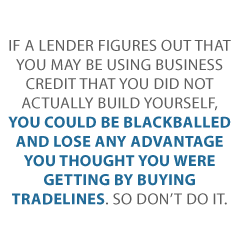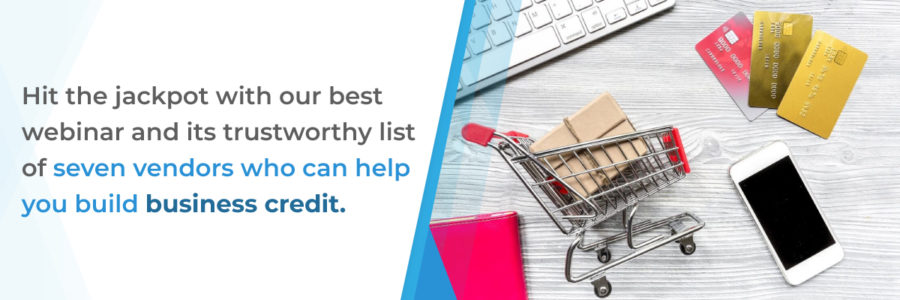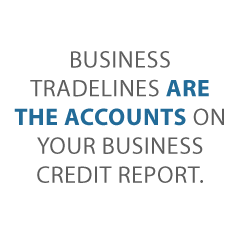
It’s Not Worth It: Here’s What 6 Organizations Have to Say About Buying Business Tradelines for Sale
You probably know why you need tradelines on your business credit reports. However, there is a right way and a wrong way to get them there. Adding tradelines is important, but you should definitely avoid business tradelines for sale. Buying tradelines can hurt more than it helps.
Buying Business Tradelines for Sale Isn’t The Shortcut it May Seem
Honestly, there are no shortcuts in life or business. Think about it. Inevitably when you try to cut corners to make things go faster, you miss something important. More times than not, it ends up costing more time and money than it would have if you had just done it the right way to begin with. This is as true about building business credit as it is anything else.
Still, some people try shortcuts anyway. The top three “shortcuts” to building business credit are:
- Buying tradelines
- CPNs (credit privacy/profile numbers) and
- Buying shelf corporations
For many, buying tradelines seems like the easiest and least risky shortcut. However, these 6 organizations agree, it’s just not worth it.
#1 Federal Reserve
“The potential distortions in credit scores that piggybacking credit may introduce suggest that a reconsideration of existing regulations, industry practices, or both may be warranted to preserve the predictiveness of credit scoring models.”
Credit Where None is Due? Authorized User Account Status and “Piggybacking Credit”, Robert B. Avery, Kenneth P. Brevoort, Glenn B. Canner (Federal Reserve Board, March 5, 2010)
# 2 Dun & Bradstreet
According to a Former D&B Employee:
“Opening a business credit account with any company is free. If you are paying for it, you are being ripped off. When the company who sold that tradeline to you gets taken down, all of their clients will get punished, too, with a mound of debt and a cursed credit file that will keep you from getting more credit to be able to pay it off.”
Joy Greenwood, 10 Common Trade-Line Mistakes, June 5, 2015
# 3 The FBI
When commenting on a 2013 bust of a fraud ring, “A second kind of tradeline is the “authorized user” tradeline, where a credit card holder adds another, so-called “authorized user,” to a credit card account. This raises the credit score of the authorized user, who inherits some of the primary user’s credit history.
Some defendants created and sold fake lines of credit for false identities made up by other defendants. These fraudulent primary tradelines were then used to increase the credit limits on fraud cards, so that the defendants could reap even larger profits. Defendants used the authorized user tradelines to create new identities.”
#4 FICO
FICO’s opinion on piggybacking is obvious here: “A … shadier version of piggybacking has been promoted by some CROs who offer to “rent” to their credit-challenged customers the trade lines of established account holders, in an effort to boost their customers’ credit profiles and scores.”
#5 Equifax
Equifax: “… authorized user abuse occurs when low-risk primary card owners “rent” their tradelines with extensive credit histories, high credit limits and solid repayment profiles to others – most times, knowingly, to fraudsters.”
#6 Experian
Experian: “Buying tradelines may be viewed as deceptive by lenders and credit reporting agencies, and could even put you in danger of committing bank fraud.
Credit scores are designed to help lenders determine a borrower’s creditworthiness, and most use your credit scores and credit reports to determine whether to approve a credit application and what terms you qualify for.
If you pay money to improve your credit scores without doing any of the work or even getting a card to use, you could be falsely representing your creditworthiness to potential lenders.”
Buying Business Tradelines for Sale
So, what are business trade lines, and how does buying business tradelines for sale work? Legit business trade lines are lines of credit extended to businesses by vendors. A business gets goods or services and agrees to pay for them at a later date. Tradelines are often established between a business and a vendor, rather than a line of credit offered by a bank. They can help businesses build credit by rapidly building positive credit experiences.
There are many companies online which promise to sell ‘seasoned’ tradelines. If your company has poor or little credit, you can pay to have your business piggyback on the account of someone with well established, strong credit. This allows new business owners to seem more creditworthy than they really are. Sounds fishy right?
How Does Piggybacking a Tradeline Work?
A third party uses a creditworthy borrower’s accounts to improve their own credit. The borrower adds the third party as a user of his lines of credit. But, he or she does not actually provide the third party with credit cards or account numbers. The third party has no way to actually make charges against the account. As a result, that third party user never actually uses the credit.
The benefit to the third party is an improved credit rating. It appears they already have higher limit revolving accounts. In theory, showing you already have credit makes you more creditworthy for higher limit accounts. Some companies claim to be able to secure $100,000 – 250,000 credit lines once these accounts are reporting. Obviously, this buying of business tradelines for sale is dishonest.
A company offering the piggybacking service maintains a network of creditworthy ‘card holders’ or ‘vendors.’ They will add strangers to their accounts as users for a fee. A third party, looking to increase their credit score, contacts the company. Then, the company selects one of the business tradelines for sale to the client, and charges the client a fee per account.
It Works for Personal Credit, so What’s the Problem?
Now, it’s important to note that personal credit works differently than business credit in this area, and many other areas for that matter.
Consumer trades such as this are legitimate. A person with poor credit can use this strategy without issue. So, if you know someone with great credit, it is perfectly fine to ask if you can become an authorized user on their card. You never need to use the card, and it can still help to raise your personal credit scores.
But, in the business credit realm, things are much different. Consider what the following agencies have to say.
Lenders Know All About Business Tradelines for Sale
Lenders and CRAs know all the unethical methods out there. They know what to look for, and they are looking. For example, when they see a change in company ownership, or a new authorized user on a card, they dig deeper. Furthermore, sooner or later D&B will figure out you are using business tradelines for sale. If a tradeline sales company inquires into your credit report, D & B finds out.
Any time you buy a tradeline, the seller checks your credit. Of course they do, because they want to be sure they get paid. When this happens, here is what happens next:
- D&B shuts down tradeline(s)
- They red flag your entire profile, including legit trades alongside the illegitimate ones
- You lose whatever time you think you gained by using business tradelines for sale
- Plus, you’re out the cost of the tradelines
In addition, when a company has a reputation of being a tradeline seller, that company will be flagged as such. Any new inquiries by that flagged tradeline seller harms buyers, including older tradeline sales. There is no Statute of Limitations on this. That means, if you bought tradelines 50 years ago, D&B may still find out and it can still harm you.
Buying Business Tradelines for Sale is Not Worth It
Buying tradelines involves buying tradelines that belong to others and putting them on your credit report. While not technically illegal, it is dishonest. If a lender figures out you are doing it, you could be black balled. It isn’t worth it.
Still, adding tradelines to your business credit report is vital. You just have to do it the right way. Our Business Finance Suite helps you do just that. It walks you through the process step-by-step, so you get your own tradelines that you can actually use. Find out more today by getting a free Business Finance Assessment with a Credit Suite specialist.
The post It’s Not Worth It: Here’s What 6 Organizations Have to Say About Buying Business Tradelines for Sale appeared first on Credit Suite.



